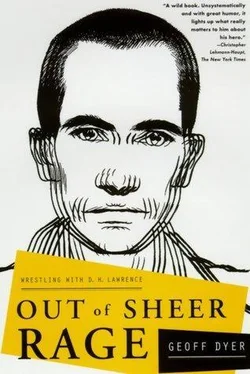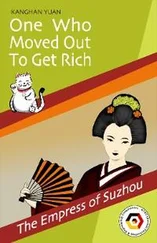*
Wondering if it was worth it, I drove from Eastwood out beyond Brindsley and Underwood, vaguely in search of the ruins of the Haggs farm, home of Jessie Chambers, the Miriam of Sons and Lovers .
I couldn’t find the farm but I stopped the car and looked across the fields, taking in that grazing English countryside I have never cared for: mud, tractor marks, hedgerows, scrubby land, brambles. A scene which generated its own weather, which dragged the sky down to its own level. A cowscape without cows. A BSE landscape. Farm weather: everything damp and giving off a dank sense that it had never dried out, would never dry out except in recollection, except in memory. The preferred nest of any bird in this part of the world was an old tyre. I picked up one of these tyres, propped near a gate which was itself leaning against the hedge for support. Water sloshed out from the tyre, water that had been lying there for a hundred and fifty years, before the tyre was even invented. The puddles by the roadside offered no reflection: the water was too old for that, was no longer sensitive to light. There was no wind: it was so still you wondered how the trees dispensed with their leaves. Did these trees ever have leaves, or did they just grow like that? Every now and then there was a break of birds from one bare tree to the next. The sky was moving towards rain. I felt cramped, hemmed-in, as if I were still indoors: a desolate, wall-less version of the indoors where the sky was a low, damp ceiling that leaked. It was not just the rain. The sea was seeping up through the foundations, coming through the earth.
In 1928 Lawrence replied excitedly to a letter from Jessie’s brother, David, declaring that ‘Whatever I forget I shall never forget the Haggs. . whatever else I am I am somewhere still the same Bert who rushed with such joy to the Haggs.’ A few months earlier, following a visit from his sister Emily, he had written: ‘I am not really “our Bert”. Come to that, I never was.’
I had often puzzled over the contradiction contained within these rival claims but as I stood in the drizzle, in the proximity of a place I had been unable to find, had not really looked for, it was obvious that they were both true, that they actually depended on each other for their truth. Taken on their own, individually, both would have been false; the truth lay in the contradiction.
On my next-to-last day in Algeria I travelled to the Roman ruins at Tipasa, fifty miles along the coast. As we began the long curve and haul out of the city, rain spotted the windshield. Difficult not to take the weather personally and on this day, when it was so important that the sun shined, I thought of Camus’s own return to Tipasa: ‘walking through the lonely and rain-soaked countryside’, trying to find the strength ‘which helps me to accept what exists once I have recognised that I cannot change it’. Not like me. I can’t accept anything, especially things I am powerless to change. The only things I can accept are those that I do have the power to change. This, I suppose, is the opposite of wisdom.
We drove through mountains and then out along a dull coast road. We passed half-finished buildings, the inverted roots of reinforcing rods sprouting from concrete columns: the opposite of ruins: a premonition of vile Furci. Then, ten minutes from Tipasa, the clouds were rinsed blue and the sky began to clear. Shadows cast by thin trees yawned and stretched themselves awake. That is the thing about autumn in Algiers: even when it is cloudy there is the promise of sun.
By the time I entered the ruins the sky was blue-gold, stretched taut over the crouched hump of the Chenoua mountains. The ruins were perched right on the edge of the sea: truncated columns, dusty blue-prints of the past. The sea was sea-coloured, the heat had a cold edge to it. I walked through the remnants of ancientness until, close to the cliffs, I came to a brown headstone, shoulder-high, two feet wide. On it, in thin letters, was scratched:
JE COMPRENDS ICI CE
QU’ON APPELLE GLOIRE
LE DROIT D’AIMER SANS
The monument was erected by friends of Camus after his death. Since then his name had been vandalised. The weatherworn inscription from ‘Nuptials at Tipasa’ was already difficult to read. Thirty years from now the words will have been wiped clean by the sun and the sea that inspired them. There was a hollow boom of surf as if some massive object had been chucked into the sea. Waves surfed in on themselves. The horizon was a blue extinction of clouds.
If my trip had a goal then I had reached it. More than anything else it was Camus’s two essays evoking ‘the great free love of nature and the sea’ at Tipasa that made me come to Algeria. What I hadn’t realised then and only understood later, in Rome, was that there was another, self-interested motive for travelling to Algiers and Eastwood: I came to these places, to Camus’s and Lawrence’s places, like Tess to the D’Urbervilles: to claim kin with them, to be guided by them.
I drove back to Cheltenham, glad of the motorways that had ruined the countryside, glad of the car that smudged the air, back to my parents’ house on the semi-detached estate on the edge of town that had played its part in ruining the Cotswolds. I took a detour, past the house in Fairfield Walk where I was born, where my mother used to wait for me to return from school in that smoky room. Like Lawrence’s mother, she was proud of the fact that we had an end terrace. There had been a simple hierarchy of domestic architecture then: terrace, semi-, detached. We moved into a semi-detached house, partly, I think to consolidate my status as a grammar-school boy. Most of the people at grammar school lived in semis. Now the cramped terraced house is worth more than the semi we moved into as part of our move up in the world. These days we aspire to terraced housing. A few doors along from our old house a place was for sale. I had half a mind to call the estate agent: perhaps there would be some doomed fulfilment in ending up in the same street where I was born.
I also thought of knocking on the door of our old house, explaining that I was born there, that I lived there until I was eleven, and wanted to look around. I abandoned the idea as soon as I’d thought of it. Houses have no loyalty. We can live in a place ten years and within a fortnight of moving out it is as if we have never been there. It may still bear the scars of our occupancy, of our botched attempts at DIY, but it vacates itself of our memory as soon as the new people move their stuff in. We want houses to reciprocate our feelings of loss but, like the rectangle of unfaded paint where a favourite mirror once hung, they give us nothing to reflect upon. Often in films someone goes to a house where he once spent happier times and, slowly, the screen is filled with laughing. This convention works so powerfully precisely because, in life, it is not like that. It testifies to the strength of our longing: we want houses to be haunted. They never are.
When I last saw him my father said he was glad to leave our old house because of the view from the front-room window which was actually a view of nothing except other houses. When we were selling the house someone came to see it and said, looking out the window: ‘Not very pretty is it?’ It wasn’t. Better than the view from Walker Street as it now is, not a patch on the view Lawrence evoked — and nothing like the view from the window of Laura’s apartment where I sat looking through the notes I had made in Eastwood, where I am actually sitting, months later, writing this. What could be more lovely? A jumble of fifteenth-century buildings so close together that — Calvino has suggested — a bird might think that these roofs were the surface of the world, that the streets and alleys were canyons, cracks in the red-tiled crust of the earth. Sheets hung out to dry, pairs of jeans running on thin air. Balconies overflowing with plants. Just visible in the distance, the dome of Saint Peter’s. And over all of this, a sky of Camus-blue. .
Читать дальше












